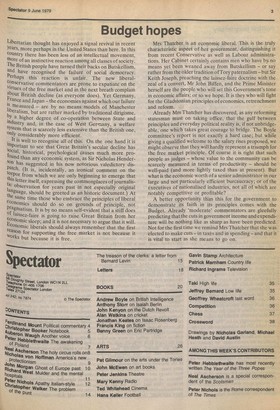Budget hopes
Libertarian thought has enjoyed a signal revival in recent Years, more perhaps in the United States than here. In this country there has been less of an intellectual movement, more of an instinctive reaction among all classes of society. The British people have turned their backs on Butskellism, and have recognised the failure of social democracy. Perhaps this reaction is unfair. The new liberalconservative commentators are prone to expatiate on the virtues of the free market and in the next breath complain about British decline (as everyone does). Yet Germany, France and Japan — the economies against which our failure 15 measured — are by no means models of Manchester liberalism, but are rather marked by traditional dirigisme, 13. Y a higher degree of co-operation between State and industry and, in the case of West Germany, a welfare System that is scarcely less extensive than the British one, only considerably more efficient. It is well to recognise all of this. On the one hand it is Important to see that Great Britain's secular decline has social, historical, psychological causes much more profound than any economic system, as Sir Nicholas Henderson has suggested in his now notorious valedictory dispatch. (It is, incidentally, an ironical comment on the torpor fromwhich we are only beginning to emerge that this letter itself, expressing the commonplaces of journalistic observation for years past in not especially original language, should be greeted as an historic document.) At the same time those who embrace the principles of liberal economics should do so on grounds of principle, not Pragmatism. It is by no means self-evident that a stiff does of laissez-faire is going to raise Great Britain from her economic sleep; and it is not necessary to argue that it will. Economic liberals should always remember that the first reason for supporting the free market is not because it works but because it is free. Mrs Thatcher is an economic liberal. This is the truly characteristic aspect of her government, distinguishing it from recent Conservative as well as Labour administra tions. Her Cabinet certainly contains men who have by. no means yet been weaned away from Butskellism — or say' rather from the older tradition of Tory paternalism —but Sir Keith Joseph, preaching the laissez-faire doctrine with the zeal of a convert, Mr John Biffen, and the Prime Minister herself are the people who will set this Government's tone in economic affairs: or so we hope. It is they who will fight for the Gladstonian principles of economics, retrenchment and reform.
Already Mrs Thatcher has discovered, as any reforming statesman must on taking office, that the gulf between principles and everyday political reality is, if not unbridgeable, one which takes great courage to bridge. The Boyle committee's report is not exactly a hard case; but while giving a qualified welcome to the salary rises proposed, we might observe that they will 'hardly represent a triumph for the free market principle. Of course it is right that such people as judges — whose value to the community can be scarcely measured in terms of productivity — should be well-paid (and more lightly taxed than at present). But what is the economic worth of a senior administrator in our large and not particularly efficient burcaucracy; or of the executives of nationalised industries, not all of which are notably competitive or profitable?
A better opportunity than this for the government to demonstrate its faith in its principles comes with the Budget. Already 'moderate' commentators are gleefully predicting that the cuts in government income and expenditure will be nothing like as sharp as have been predicted. Not for the first time we remind Mrs Thatcher that she was elected to make cuts — in taxes and in spending — and that it is vital to start as she means to go on.










































 Previous page
Previous page